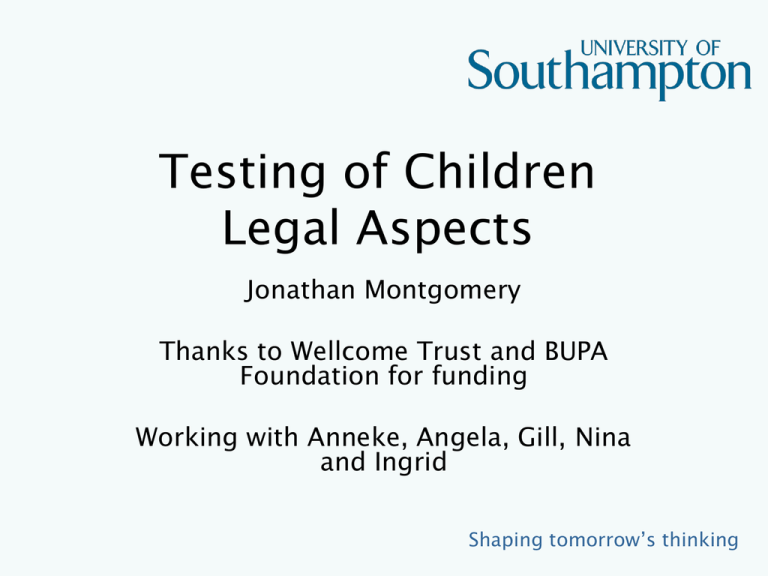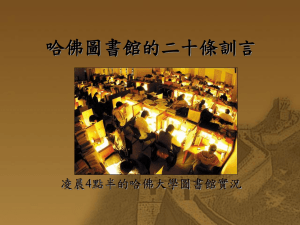
Testing of Children
Legal Aspects
Jonathan Montgomery
Thanks to Wellcome Trust and BUPA
Foundation for funding
Working with Anneke, Angela, Gill, Nina
and Ingrid
Shaping tomorrow’s thinking
BSHG Report
• Authorisation (consent)
– Help ensure valid authorisation secured
• Liability (legal and professional)
– Acceptable practice
– Good practice
• Consistent with existing guidance
– Generally defer testing unless benefits
during childhood
– But ‘broad’ view of benefit
Shaping tomorrow’s thinking
Gillick v W Norfolk AHA
[1985] 3 All ER 402
1. Children’s welfare
is the foundation of
parental authority
2. Competent
children’s
autonomy should
prevail over
parental control
Shaping tomorrow’s thinking
Legal Principles 1
• Foundation of parental rights in
children’s interests (Gillick)
• Courts must assess objectively
children’s interests
– NOT whether parental views ‘reasonable’,
‘rational’, ‘understandable’
• Professionals expected to act as
advocates, defining scope of choice
Shaping tomorrow’s thinking
Who Decides Theory
No one can dictate the treatment to be given
to any child, neither court, parents nor
doctors. . .
Re J [1991] 3 All ER 930, 934
Shaping tomorrow’s thinking
The doctors can recommend treatment
A in preference to treatment B. They
can also refuse to adopt treatment C on
the grounds that it is medically
contra-indicated or for some other
reason is a treatment which they
could not conscientiously administer.
Shaping tomorrow’s thinking
The court or parents for their part can
refuse to consent to treatment A or B or
both, but cannot insist on treatment C.
The inevitable and desirable result is
that choice of treatment is in some
measure a joint decision of the doctors
and the court or parents.
Shaping tomorrow’s thinking
Welfare
• Distinction European and BHSG
Guidelines on whether best interests a
narrowly medical test or wider one
Shaping tomorrow’s thinking
Children Act
1989, s.1
(1) When a court determines any
question with respect to—
(a) the upbringing of a child…
the child’s welfare shall be the
court’s paramount consideration.
Shaping tomorrow’s thinking
J v C [1970] AC 668,
per Lord MacDermott 710
“I think they connote a process whereby,
when all the relevant facts, relationships,
claims and wishes of parents, risks,
choices and other circumstances are
taken into account and weighed, the
course to be followed will be that which
is most in the interests of the child's
welfare.”
Shaping tomorrow’s thinking
Welfare checklist
(Children Act 1989, s1(3)
… a court shall have regard in particular to—
(a) the ascertainable wishes and feelings of
the child concerned (considered in the light
of his age and understanding);
(b) his physical, emotional and educational
needs;
(c) the likely effect on him of any change in
his circumstances;
Shaping tomorrow’s thinking
(d) his age, sex, background and any
characteristics of his which the court
considers relevant;
(e) any harm which he has suffered or is at
risk of suffering;
(f) how capable each of his parents, and any
other person in relation to whom the court
considers the question to be relevant, is of
meeting his needs;
(g) [the range of powers available]
Shaping tomorrow’s thinking
Re MB [2006]
para 16
‘Best interests are used in the widest
sense and include every kind of
consideration capable of impacting on
the decision. These include, nonexhaustively, medical, emotional,
sensory (pleasure pain and suffering)
and instinctive (the human instinct to
survive) considerations.
Shaping tomorrow’s thinking
Legal Principles 2
• Children’s autonomy rights
– Gillick and since
• Children’s participation rights
– Article 12 UN Convention on the Rights of
the Child 1989
• Guidance assumes value of preserving
autonomy to be exercised in future
• How important is autonomy in law?
Shaping tomorrow’s thinking
Retreat from Gillick
• Donaldson as denying autonomy and
reinforcing welfare
–
–
–
–
Consent but not refusal
Tail wagging dog problem
Fragility – dependence on competence
Weakness – liable to be overridden by parents or
court
Re R [1991] 4 All ER 177
Re W [1992] 4 All ER 627
Shaping tomorrow’s thinking
• Child’s competence
– Re R: Fluctuation
– Re W: impaired competence
• Concurrent consents (Re W)
– Parental control or medicalisation?
• Supervisory jurisdiction of the court
– Welfare principle
Shaping tomorrow’s thinking
Reaffirmation of
Children’s Rights?
Axon [2006] EWHC 37
(Admin)
Parents not entitled to
be informed about
family planning advice
and treatment
(including abortion)
Firmly based on Gillick
Shaping tomorrow’s thinking
A Battle Won?
• Axon did not consider the Donaldson
cases
• It turned on an interpretation of a key
paragraph in Gillick that Donaldson
had specifically rejected
• Arguably inconsistent with the CA
decisions
• Is only the decision of one High Court
judge
Shaping tomorrow’s thinking
Consistency in Law?
Shaping tomorrow’s thinking
Human Tissue
Act 2004
• Research on tissue (human cells other
than hair, nail, embryos)
• Children with their consent (s 2)
– Parental consent only if incompetent or
have not taken a decision
– Public display & anatomical examination
only with written witnessed consent of
child
Shaping tomorrow’s thinking
Data Protection (Subject
Access Modification) (Health)
Order
• parents can normally seek information
• child may veto access
– Where they are able to appreciate the nature of
the application for access
• Not bound to allow the parents access if it
would cause serious harm to the physical or
mental health or condition of the child
• Access cannot be given to any part of the
record that would disclose information
provided by a child in the expectation that it
would not be disclosed to the applicant
Shaping tomorrow’s thinking
The Medicines for Human Use
(Clinical Trials) Regulations
2004
• Parental interview and consent
– Objectives, risks, inconveniences
– Represent child’s ‘presumed will’ (para 13)
• Child to be informed
• Child’s objection to be ‘considered’ by
investigator
• NB ‘adult’ here is 16 years and above
SI 2004 No 1031
Schedule 1,
Children Part 4
Shaping tomorrow’s thinking
Convention on Human
Rights and Biomedicine
• Additional protection of those unable
to consent (art 17(1))
– results of research potential real and
direct benefit to subject
– research cannot effectively be carried out
on individuals capable of giving consent
– proxy consent
– no objection
Shaping tomorrow’s thinking
Convention on Human
Rights and Biomedicine
• Exceptionally, research on those not
competent to consent and not directly
benefiting (art 19(2))
– indirect benefit to person of others in
same category
– only minimal risk and
minimal burden
Shaping tomorrow’s thinking
Some Models
Shaping tomorrow’s thinking
Modelling the
dispute: family
privacy?
Child
Parent
Doctor (State?)
Shaping tomorrow’s thinking
Modelling the
dispute: agency
Child
Parent
Doctor
Shaping tomorrow’s thinking
Modelling the
dispute: conflict
Child
Parent
Doctor
Shaping tomorrow’s thinking
Modelling the
dispute: property
Child
Parent
Doctor (State?)
Shaping tomorrow’s thinking








